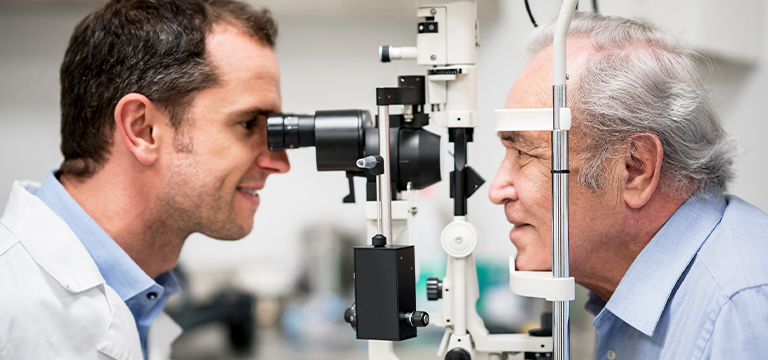Tips to improve your eye health

It’s not an exaggeration to say that we depend on our eyes every day. But many people don’t consider how their lifestyle impacts their eyes. In fact, eye health is not entirely determined by genetics. Like other aspects of our health, what you do can affect your eyesight.
Here are some simple tips for protecting your eyes.
Wear sunglasses outside
UV light harms your eyes just like it does your skin. It can cause cataracts, cornea burns and even cancer of the eyelid. Make sure your sunglasses offer protection from both UVA and UVB rays. These rays still reach your eyes even when it’s cloudy.
Take screen breaks
Prolonged use of digital devices like computers, tablets and smartphones can lead to symptoms of digital eye strain, including eye fatigue, dryness, blurry vision and headaches. Practice the 20-20-20 rule. Every 20 minutes, take a 20-second break to look at something 20 feet away.
Eat a balanced diet
Citrus fruits, dark leafy greens and whole grains all promote better circulation. Foods rich in zinc, such as beans, peas, peanuts, oysters, lean red meat and poultry, help your eyes resist damage from UV light. Also, carrots promote better eyesight due to their vitamin A content.
Beware old eye makeup
Eye makeup can harbor bacteria growth. It’s best to throw out any makeup that’s more than three months old. To avoid spreading bacteria to your eyes, never share makeup or use in-store samples. If you develop an eye infection, throw away your makeup and see a doctor.
Cut tobacco use
Smoking poses a lot of health risks to your eyes. It significantly increases your risk of macular degeneration and cataracts. It also promotes plaque growth in your arteries and weakens circulation. Thankfully, quitting reduces your risk of eye disease to a level similar to that of a non-smoker.
Know your health
Many health conditions can also impact your eyes. High blood pressure, diabetes and thyroid disease are some examples. Talk with your vision care provider about your health so they can understand the whole picture.
Get annual vision care exams
Yes, even if you have good eyesight. Vision care exams give doctors an in-depth look at your eye health, plus some aspects of your overall health, too. It’s recommended that most adults get vision care exams at least every other year. Talk to your doctor about how often it makes sense for you.
Sign up for vision coverage
Reduce your out-of-pocket costs for vision care with vision coverage. BCBS FEP Vision offers comprehensive benefits for federal employees, retirees and their families. It also offers coverage for retired uniformed service members, their families and the families of active duty service members.
The Blue Cross and Blue Shield Federal Employee Program, Blue Cross Blue Shield FEP Dental and Blue Cross Blue Shield FEP Vision are all separate, independently operated plans with benefits outlined in each of their respective brochures.
Find a provider with BCBS FEP Vision
BCBS FEP Vision members enjoy quality coverage that’s always close to home, with access to over 175,000 independent providers and national retailers. Explore today at bcbsfepvision.com/providers.
Sources:
- webmd.com/eye-health/common-eye-problems
- aarp.org/health/conditions-treatments/info-2020/computer-glasses-blue-light-protection.html?cmp=KNC-DSO-COR-Health-EyeStrain-NonBrand-Exact-29447-Bing-HEALTH-ConditionsTreatments-ConditionsTreatments-DigitalEyestrain-Exact-NonBrand&gclid=9570

